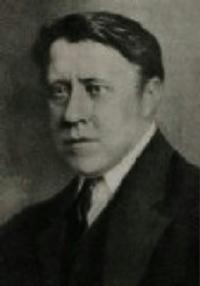André Caplet
André Léon Caplet (born November 23, 1878 in Le Havre , † April 22, 1925 in Neuilly-sur-Seine ) was a French composer and conductor .
Life
Caplet's father was considered the best piano tuner in Le Havre. The young André received his first musical training on the violin . He won a first prize at the age of nine and played the violin in the theater orchestra in his hometown at the age of twelve. In 1896 he began studying harmony , piano accompaniment and composition at the Paris Conservatory with , among others, Henri Woollett . In the same year he began first as a timpanist, then as a conductor of the Concerts Colonne. His teachers were Charles Lenepveu , Xavier Leroux and Paul Vidal . At 19 he was able to conduct for the first time at the Théâtre de la Porte Saint-Martin , where he was appointed music director two years later. Besides his enthusiasm for everything musical, Caplet loved painting and was enthusiastic about natural spectacles.
In 1901 he was awarded the Prix de Rome for the cantata Myrrha (among others against Ravel's competition ) . After returning from Rome, Caplet became a student of Claude Debussy . Until 1910 he was conductor of the Concerts Colonne, and from 1910 to 1914 he conducted at the Boston Opera . In 1912 he directed the English premiere of Debussy's opera Pelléas et Mélisande . Debussy entrusted him with the orchestration of the stage work Le Martyre de Saint Sébastien , the world premiere of which he conducted.
In 1914 Caplet was appointed musical director of the Paris Opera. A few days later, however, after the outbreak of World War I , he volunteered for military service. During his military service, he suffered gas poisoning. The resulting pleurisy forced him to give up his conducting activity - since then he has only devoted himself to composition - and contributed to his relatively early death.
plant
Caplet was friends with Debussy and orchestrated long passages from his Le Martyre de Saint-Sébastien . He also supported him in the orchestration of La Boîte a Joujoux . In 1911 Caplet made an orchestral version of Debussy's Children's Corner ; this is perhaps - together with his orchestral version by Clair de Lune from the Bergamasque Suite - Caplet's work most frequently performed today.
As a composer, Caplet was influenced in his early years by César Franck and later by Gabriel Fauré . Like many other French composers, Caplet was fascinated by the Orient. This is how his Persian Suite for double wind quintet was created around 1900 . After that, Debussy's influence was clearly noticeable. In his later work, however , he left impressionism behind in part, and neoclassical traits, and in the vocal work in part also a turn to Gregorian chant , are recognizable. Caplet was open to avant-garde tendencies, so he was the first French conductor to conduct Arnold Schönberg's Five Orchestral Pieces . He wrote orchestral works, chamber music in various formations and vocal works, including numerous sacred works (including Les Prières , Mass for three voices , Le Miroir de Jésus ).
Works (selection)
- Quintet for piano, flute, oboe, clarinet and bassoon (1898)
- Persane suite for decett (2 flutes, 2 oboes, 2 clarinets, 2 horns, 2 bassoons; around 1900)
- Myrrha , cantata, written for the Rome Prize (1901)
- Septet for 3 female voices and string quartet (1909)
- Inscriptions Champetres for choir (1914)
- After 1914 numerous songs, Le pain quotidienne became very famous
- Douaumont for military orchestra (1917)
- Conte Fantastique for harp and string quartet, after The Mask of the Red Death v. Edgar Allan Poe (1919), also as an orchestral version
- Les prières for female voice, harp and string quartet (1922)
- Epiphany for cello and orchestra (1923)
- Le miroir de Jesus (1923), for voice and string instruments
- Divertissements for harp (1924)
literature
- Bernac, Pierre. The Interpretation of French Song , Norton, New York, 1978, ISBN 0-393-00878-9
- Pešek, U., Pešek, Ž .: Flute music from three centuries , Bärenreiter Verlag, 1990, ISBN 3-7618-0985-9
Web links
- Works by and about André Caplet in the catalog of the German National Library
Individual evidence
- ^ A b c d e Henri Brunière: André Caplet . In: Vossische Zeitung , July 11, 1925, morning edition, p. 11.
| personal data | |
|---|---|
| SURNAME | Caplet, André |
| ALTERNATIVE NAMES | Caplet, André Léon (full name) |
| BRIEF DESCRIPTION | French composer and conductor |
| DATE OF BIRTH | November 23, 1878 |
| PLACE OF BIRTH | Le Havre |
| DATE OF DEATH | April 22, 1925 |
| Place of death | Neuilly-sur-Seine |
